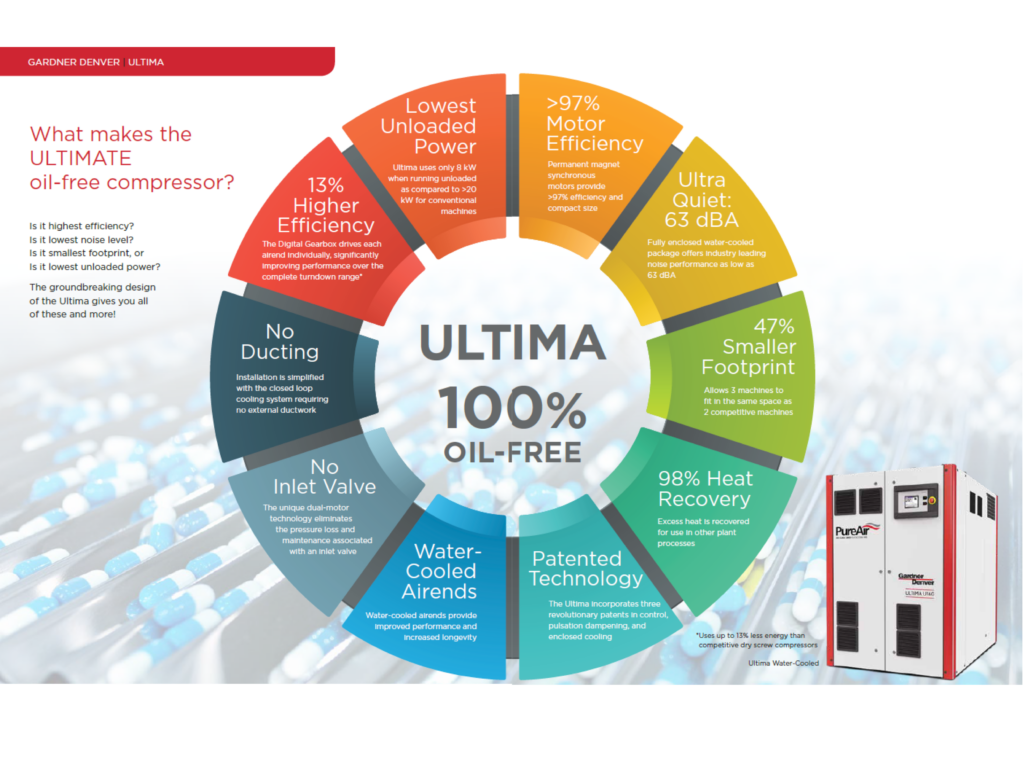How Do Oil-Free Air Compressors Work?
For industries where product contamination can be a costly problem, compressed air purity is a top-of-mind concern. For other manufacturers where sensitive production equipment must remain free of contamination to avoid expensive downtime, compressed air cleanliness is also a high priority. Unfortunately, even with the best filtration systems, oils used to lubricate traditional air compressors may still find a way into the compressed air and spoil finished product or damage delicate equipment. In industries such as food and beverage, pharmaceuticals, electronics, medical devices and others where compressed air contamination is a major worry, oil-free air compressors may be the solution.
What is an Oil-Free Air Compressor?
Oil-free air compressors do not use any oil within the compression chamber. Instead, some versions of this specialized air compressor type use alternative materials such as water or Teflon to protect components while allowing them to move smoothly without the use of oil-based or synthetic lubricants. Other oil-free compressor designs have completely removed metal-to-metal contact from the compression chamber, eliminating the need for any lubrication at all. It should be noted that in some oil-free models, the bearings and gears within the gearbox will still require lubrication; however, this is external to the compression chamber and proper sealing of the gearbox ensures that oil will not contaminate the delivered compressed air.
It should also be explained that there is a difference between oil-free and oil-less air compressors. Oil-less air compressors have no oil present in the compression package. While oil-less compressors do reduce contamination risks, they work by first expelling air, filtering the air to eliminate contamination and then pressurizing and cooling the air for use.
Compressed air purity is ranked according to ISO Standards from 0 to 5, with Class 0 providing the purest, cleanest, highest quality air. Oil-free air compressors provide 100% oil-free air and usually have an ISO Class 0 designation. For this reason, oil-free air compressors are likely the best solution for compressed air applications where meeting the highest air purity standards is essential. Oil-less air compressors may be considered ISO Class 1. For this reason, it’s best to consult with an expert when deciding whether an oil-free or oil-less air compressor meets the compressed air purity level needed for your specific application.

How Do Oil-Free Air Compressors Work?
Simplistically, all air compressors function in the same manner: As air is drawn into the compression chamber, its volume is decreased and its pressure is increased as the air is forced into a pressurized storage tank. While oil-free air compressors operate via the same basic principle, different oil-free compressor designs will have slightly different operating principles. There are three common technologies:
Oil-free rotary screw compressors: This type of oil-free air compressor uses external gears to synchronize the position of the counter-rotating screw elements. Because the rotors do not come in contact with each other, there is no friction and, therefore, no lubrication is needed in the compression chamber. The gearbox that drives the rotors will likely contain oil, but is contained in a separate, sealed chamber so no oil can enter the compression chamber during normal operation. An internal air cooler or a water-cooled radiator may be used to cool the compression chamber.
Oil-free piston compressors: In this type of oil-free compressor, mechanical components, such as the piston and valves, are coated in Teflon or another material that reduces friction and allows the mechanism to move freely without the use of oil lubricants. The compression chamber is usually cooled by an external fan.
Oil-free scroll compressors: These oil-free air compressors offer two spiral-shaped metal pieces that fit one inside the other and reside inside the compression chamber. As air is brought into the compression chamber, the inner spiral oscillates inside the outer spiral. The two work together to compress the air by decreasing its volume. Air is then sent to the center of the compressor to be cooled. The spiral scrolls in this design do not make contact, so this type of oil-free compressor does not require lubrication in the compression chamber. Movement of the spirals is generated from a sealed gearbox, which does require oil to lubricate gearbox components; however, the oil within the gearbox is prevented from entering the compression chamber with proper sealing.
What are the Benefits of Oil-Free Air Compressors?
Aside from the obvious benefits of delivering the purest compressed air to applications that must avoid product spoilage, product recalls or damage to sensitive production equipment, there are other worthwhile benefits associated with oil-free air compressors.
Oil-free air compressors do not require downstream filter replacements because they are not filtering oil out of the compressed air system. Additionally, because there is no oil, there is no need to separate oil from the condensate, which reduces both equipment and disposal costs. Oil and maintenance costs are also reduced, as there is no need to continually refill the compressor with oil or change oil-catching filters. Oil-free air compressors also tend to be kinder on the environment as there is no oil leakage or disposal associated with their use. Further, energy requirements are reduced as pressure drops caused by filtration are eliminated.
What is the Lifespan of an Oil-Free Air Compressor?
Typically, oil-free air compressors do have a shorter lifespan in terms of service hours than traditional oil-lubricated units because the Teflon (or other coating) used to lubricate the internal cylinder will eventually wear off or degrade over time. Service life may be further reduced in applications where the compressor sees high temperatures or runs for longer-than-normal periods.
Oil-free compressors also tend to generate more heat than their oiled counterparts, which means if they are subjected to high pressures or stress, the internal components are more likely to burn out or warp. The compressor design will also have an impact on the service life. For example, oil-free piston air compressors typically have a shorter lifespan than oil-free rotary screw compressors.
However, keep in mind that oil-free compressors tend not to run continuously, so the reduction of service hours may work out to be the same in terms of years of service when compared to traditional oil-lubricated air compressors that run 24/7. In addition, a solid preventive maintenance program that routinely examines moving parts, the coating on the cylinders and the seals will help elongate the service life of an oil-free air compressor.
For more information on whether your application may benefit from an oil-free air compressor, please contact an expert at JHFOSTER.
